In Short:
Kaguya-sama: Love Is War is a 2019 anime from the well known studio A-1 Pictures. In it, our two main characters, the President and Vice President of their prestigious academy’s student council, play hilarious, ever escalating mind games with each other in an attempt to force the other to be the first one to declare their love.
This is a bombastic, over the top show with off the wall situations and zany, stylized animation. It’s certainly possible that some may not like its presentation or its largely disconnected episodic nature.
Suggested Watch Minimum: 1 episode. Although the show develops a bit more of an ongoing story in later episodes, the crazy situations and misunderstandings that make up much of the show are well represented in the first episode.
Full Review:
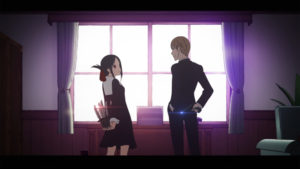 Love Is War’s inventive animation, wacky sense of humor, and crazy, bite-sized stories pulled me in almost immediately. We chiefly follow two main characters: Miyuki Shirogane, a smart, well-mannered, but financially poor high schooler who is the student council president of Shuchiin Academy. Opposite him is its student council vice president, Kaguya Shinomiya, who is the polite, clever, but heavily sheltered daughter of one of the Japan’s largest multi-corporation conglomerates.
Love Is War’s inventive animation, wacky sense of humor, and crazy, bite-sized stories pulled me in almost immediately. We chiefly follow two main characters: Miyuki Shirogane, a smart, well-mannered, but financially poor high schooler who is the student council president of Shuchiin Academy. Opposite him is its student council vice president, Kaguya Shinomiya, who is the polite, clever, but heavily sheltered daughter of one of the Japan’s largest multi-corporation conglomerates.
These two are crazy for each other, but there’s a problem: They both believe that being the first to admit their love will make them subservient to the other. In order to prevent that, the two keep their feelings a closely guarded secret from each other even as they spend much of their school days together in the large student council offices. Since neither one wants to admit their love, they engage each other in outwardly calm and subtle but inwardly dramatic and over the top mind games where they try and force the other to admit the feelings they are sure are there just beneath the surface. Seeing as our two main characters come from vastly different background, their attempts to force the other’s declaration of love vary in fun ways.
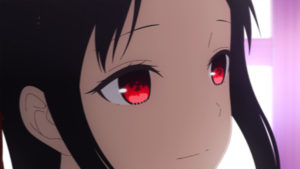 Kaguya Shinomiya comes from the massively wealth and powerful Shinomiya family, so her tactics tend to be based on her limitless wealth and power… but she’s also massively sheltered so she tends to devise absurdly complex schemes only to be foiled by her own shyness or naivety. Her biggest fear is giving up her high standards just because she’s fallen for someone. Her most endearing quality is the way she sometimes freezes up when her plans go too right too quickly.
Kaguya Shinomiya comes from the massively wealth and powerful Shinomiya family, so her tactics tend to be based on her limitless wealth and power… but she’s also massively sheltered so she tends to devise absurdly complex schemes only to be foiled by her own shyness or naivety. Her biggest fear is giving up her high standards just because she’s fallen for someone. Her most endearing quality is the way she sometimes freezes up when her plans go too right too quickly.
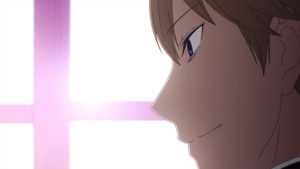 Miyuki Shirogane, on the other hand, comes from far more modest means. He only made it to the academy because of his impressive grades, not his family’s wealth, so his tactics tend to be simpler and more direct, but often fail in amusing ways. His biggest fear is doing something embarrassing and having Kaguya dismissively say to him: “How cute.” His most endearing quality is his selfless need to help others.
Miyuki Shirogane, on the other hand, comes from far more modest means. He only made it to the academy because of his impressive grades, not his family’s wealth, so his tactics tend to be simpler and more direct, but often fail in amusing ways. His biggest fear is doing something embarrassing and having Kaguya dismissively say to him: “How cute.” His most endearing quality is his selfless need to help others.
Playing a crazy, unintentional foil to our two fantastic leads is pink-haired Chika Fujiwara who is so delightful that she is very nearly the star of the show. She is so simple minded and excitable that she tends to be the hand grenade who accidentally derails the two main characters’ carefully laid plans time and time again.
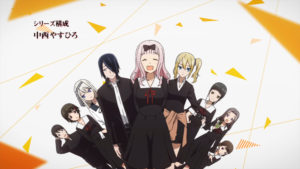 There’s also Ai Hayasaka, Kaguya’s assistant, who realizes that Kaguya and Miyuki are secretly in love and who tries to force them together in amusing ways. And there’s Yū Ishigami, an emo geek/gamer in charge of student council finance who tends to unintentionally get on the ladies’ bad side. He’ll often skulk out of the room saying “I think I’ll go home now and die…” to which someone inevitably says “ok… but please don’t actually die.” A couple of new characters are added to the student council in season two and do a great job at keeping things interesting.
There’s also Ai Hayasaka, Kaguya’s assistant, who realizes that Kaguya and Miyuki are secretly in love and who tries to force them together in amusing ways. And there’s Yū Ishigami, an emo geek/gamer in charge of student council finance who tends to unintentionally get on the ladies’ bad side. He’ll often skulk out of the room saying “I think I’ll go home now and die…” to which someone inevitably says “ok… but please don’t actually die.” A couple of new characters are added to the student council in season two and do a great job at keeping things interesting.
Most episodes are spilt into three “battles” where one side or the other tries to carry out a scheme to force the other to confess their love. One character will play their hand only to have the other counter that play in some fashion only to have that counter countered. And so it goes. During all this, they exhibit frantic worrying at whether a plan will work and wide eyed shock as one of their foolproof plans is upended with nothing more than an unexpected word or action. At the end of each battle, the ever present narrator will declare one side the winner or loser, and the episode will move on to a new situation.
What kind of schemes, you ask? Here’s a small smattering of the many many little scenarios that play out over the course of the series:
- Kaguya arranges for Miyuki and herself to receive movie tickets to a romantic movie. The two enter into a battle of wits to see who can force the other to ask them to the movies.
- Kaguya, Miyuki, and Chika play a game where they have to trick each other into saying a word each of them doesn’t know but the others can see.
- Miyuki tries to give relationship advice to a fellow male student while Kaguya secretly listens in.
- Kaguya switches Miyuki’s coffee to decaf with unexpected results.
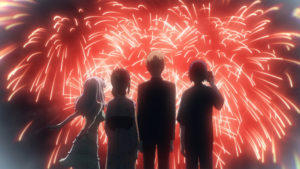 At first, the show seems like it’s not going anywhere. It’s massively fun and entertaining, to be sure, but the first few episodes are just one unrelated battle after another. But, pretty soon, you start to notice that later episodes connect to earlier ones. A plot slowly begins to form. This is not a narrative heavy show by any means, but by the end of the first season, you’ll find yourself rooting for both the main characters in ways you didn’t expect because of little plot points that have built up along the way.
At first, the show seems like it’s not going anywhere. It’s massively fun and entertaining, to be sure, but the first few episodes are just one unrelated battle after another. But, pretty soon, you start to notice that later episodes connect to earlier ones. A plot slowly begins to form. This is not a narrative heavy show by any means, but by the end of the first season, you’ll find yourself rooting for both the main characters in ways you didn’t expect because of little plot points that have built up along the way.
The second season has a bit more of a running plot, but it too has a lot of loosely connected witty one-off battles. It’s interesting to note, though, that the title changes in the second season from “Love Is War!” to “Love Is War?” The title change matches the slowly shifting objectives of the lead characters as they being to realize that, yes, the other is in love with them.
 Animation wise, this is not exactly a powerhouse in a traditional sense. A lot of episodes take place in the familiar, large-ish student council room or in other reused parts of the academy. There’s a lot of minimally animated close ups and slow panning shots. But, that’s not to say the show cheaps out in any way. Love Is War goes to extraordinarily lengths to mix things up as its two leads dive deeper and deeper into their crazy plots. The show shifts to absurd charactatures, and complex moving backgrounds, and constantly changing over the top special effects as it visualizes each characters’ thought processes. The show’s art is totally absurd and off the wall, at times, but it totally works!
Animation wise, this is not exactly a powerhouse in a traditional sense. A lot of episodes take place in the familiar, large-ish student council room or in other reused parts of the academy. There’s a lot of minimally animated close ups and slow panning shots. But, that’s not to say the show cheaps out in any way. Love Is War goes to extraordinarily lengths to mix things up as its two leads dive deeper and deeper into their crazy plots. The show shifts to absurd charactatures, and complex moving backgrounds, and constantly changing over the top special effects as it visualizes each characters’ thought processes. The show’s art is totally absurd and off the wall, at times, but it totally works!
When talking about animation, I’ve also got to heap praise on the shows’ various openings and closings. The season one opening feels like something out of a James Bond film with lots of complex shots and interesting imagery of our two leads at war with each other. The second season opens with a fun, quickly told miniature story typical of the show’s longer battles. Both openings are set to some downright groovy soundtracks that you’ll find yourself humming long after you finish the show. The closings of the seasons are also well worth watching.  They are strange and fascinating in their own ways.
They are strange and fascinating in their own ways.
And then, there’s the one-off closing for episode 3 of the first season. Titled “Chika Dance”, it features about a minute of some of the most absurdly detailed character animation you’ve ever seen. This closing had the entire internet abuzz when it first debuted, and for good reason!
All In All:
This is an outstanding, goofy series that pokes fun at the absurdity of high school students who wish they could make the other declare their love but who are too smart for their own good. It’s delightful and good natured while being laugh out loud funny several times an episode. And, as the series progresses, it does gradually reveal that it actually has some heart tucked away somewhere between all the absurdity.